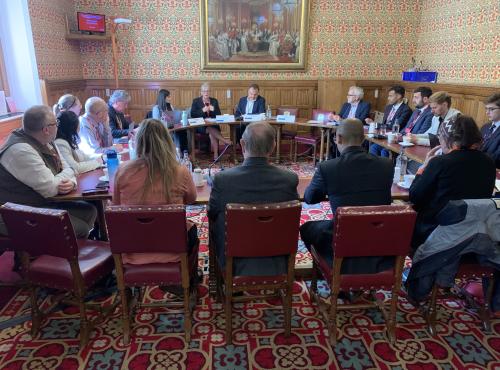Energy Election Briefing - Priorities for the next Government
On 28 June, Policy Connect, through its low carbon-energy forum Carbon Connect, held an Energy Election Briefing as part of its pre-election programme. The session heard from the energy sector on the challenges they face on planning, security, and skills for net zero. Attendees discussed policy pledges made by the main parties in relation to these three themes and outlined key priorities for the new government on overcoming these hurdles to achieve net zero targets.
Priorities for the New Government
Planning
- The incoming government must reform the planning system to provide policy certainty and encourage investment. Reforming the planning system includes fast-tracking applications for building new offshore wind infrastructure and connecting new projects to the grid.
- There needs to be a greater focus on local planning measures and distributed solutions rather than a centralised one size fits all approach.
- Introduce a wider public campaign to highlight the benefits of community energy projects, such as solar farms, is essential to fight misinformation and encourage the adoption of more community-based projects.
- The Government must remove the ban on onshore wind.
- The incoming government must be transparent and move at pace and scale to ensure the UK is in line to meet decarbonisation targets and send out a positive signal to gain investor confidence.
- The current governance structure must be reformed to improve planning efficiency. Reforms include updating national policy statements and establishing a statutory central body to deliver net zero by connecting different departments, public bodies, sectors, net zero agencies, and devolved administrations.
Security
- Maximise low-carbon flexibility and generation through incentive schemes in UK, such as the Contract for Differences Scheme.
- The Government should unlock public and private investment at scale for net zero technologies, including dispatchable energy sources and long-term storage.
- Improve energy resilience and security at the local level and incentivise communities to host the infrastructure.
- The Government should prioritise the publication of the outcomes from the Review of Electricity Market Arrangements (REMA) consultation to ensure the market is fit for purpose.
- To protect the vulnerable against future shocks, there needs to be a targeted bill support scheme for those who need it the most as opposed to universal support.
Skills
- The Government should work with industry to shape the skills system, similar to the Green Jobs Delivery Group which should be re-established post-election.
- The apprenticeship levy needs to be reformed to allow spending flexibility for employers based on certain incentives and conditions.
- The governance structure for skills needs to be reformed to ensure different departments work together, particularly the Department for Work and Pensions and the Department for Education.
- Allocate more funding and resources for upskilling especially towards building infrastructure for colleges and training providers, and to attract expert staff.
- Design a skills system that incorporates devolved administrations which is especially important for the energy sector, as Scotland plays a key role in the energy system.
- Expand the Local Skills Improvement Plan to also encompass multi-regional projects needed for the green transition. This can be a focus for combined authorities.
- A recurring priority is to provide policy certainty and clear direction on energy schemes which can provide enough lead in time for employers to train a workforce that is well-equipped to deliver these schemes.
For more information, please contact alainah.amer [at] policyconnect.org.uk (alainah[dot]amer[at]policyconnect[dot]org[dot]uk).



